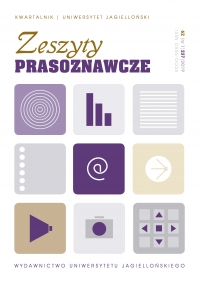Religious threat. Islam in the discourse of right-wing Polish-language web portals after the parliamentary elections of 2015 in Poland
Religious Threat. Islam in the Discourse of Right-Wing Polish-Language Web Portals After the Parliamentary Elections of 2015 in Poland
Author(s): Stella GrotowskaSubject(s): Politics, Media studies, Communication studies, Theology and Religion, Islam studies, Politics and communication, Studies in violence and power, Nationalism Studies, Present Times (2010 - today), ICT Information and Communications Technologies
Published by: Wydawnictwo Uniwersytetu Jagiellońskiego
Keywords: religion; Islam; new media ecosystem; right-wing Internet portals;
Summary/Abstract: The article shows religious phenomena as a part of agenda setting performed by Polish-language portals. The research included the content analysis of 3 intentionally chosen websites (niezalezna.pl, wPolityce.pl, telewizjarepublika.pl) identified as right-wing or conservative both by journalists and media researchers in Poland. The study was based on the assumption that communication via media has an effect on the formation of public opinion by raising specific topics, assigning meanings to objects, people or events, and moving issues from one agenda to another (e.g. from the area of politics to religion). The author also assumed that users and journalists working for right-wing portals view religion as a natural element of their worldview and are interested in religious themes. This is believed to be the reason why they pay more attention to these themes than journalists and publishers of left-wing media. The aim of the research was to find the basic topoi organizing narratives concerning religion, social contexts in which religion was situated and functions assigned to it in media interpretations. A qualitative analysis of texts regarding religious phenomena was performed. The results of the study showed that during the examined period of fifteen months between 2017-2018, most statements were related to Islam. However, the analyzed texts did not concern Poland directly. The texts focused on Islam in western Europe or other parts of the world. These fundamental topics were highlighted throughout the analysis using the agenda setting theory: conflict and violence, the clash of civilizations, demography, rivalry among religious ideas, the political agenda. Throughout the research, two components were distinguished – the cognitive and the affective. The cognitive component was based on scientific sources (for example, in texts about demographic problems), but then again it was limited to very basic and generalized statements. In the affective layer, negative emotions prevailed.
Journal: Zeszyty Prasoznawcze
- Issue Year: 2019
- Issue No: 1 (237)
- Page Range: 97-110
- Page Count: 14
- Language: English

